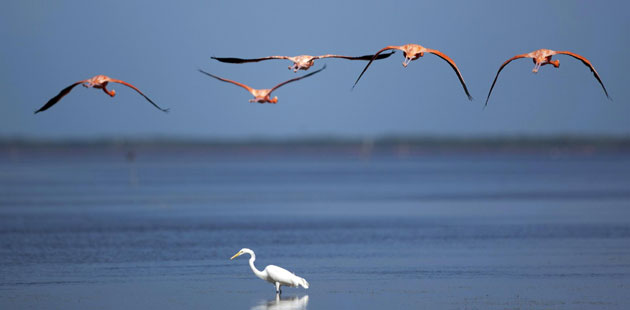HK starts building longest cross-sea bridge
Updated: 2011-12-14 21:35
(Xinhua)
|
|||||||||
HONG KONG - Hong Kong finally began on Wednesday construction of its part of the world's longest cross-sea bridge linking the city with Macao and Zhuhai, after the project was delayed for a year by a legal challenge over its environmental impact.
The city government held a brief launching ceremony in the morning on the eastern side of Hong Kong International Airport, which was attended by Chief Executive Donald Tsang, Deputy Director of the Liaison Office of the Central People's Government in Hong Kong Guo Li, Secretary for Transport and Housing of the city government Eva Cheng, and other officials and representatives from contractors.
The Hong Kong section of the massive bridge linking Hong Kong, Zhuhai and Macao includes three major projects -- Hong Kong boundary crossing facilities, the Hong Kong Link Road as well as the detailed design of Tuen Mun-Chek Lap Kok Link and Tuen Mun Western Bypass. In total, the three projects are expected to cost 48.5 billion HK dollars ($6.2 billion).
Wednesday's ceremony marked the beginning of the construction of Hong Kong boundary crossing facilities, which was the most important project with the largest investment among the three projects. Its budget was 30.43 billion HK dollars.
An 150-hectare artificial island would be built in the waters northeast of Hong Kong International Airport to house the boundary crossing facilities.
Tsang said although the start of the works has been delayed for a year, the city government would catch up on the progress through the compression of programs, and by implementing additional machinery and manpower. Construction of the Hong Kong section would be completed on schedule, enabling the bridge to be operational in 2016, he said.
Construction of the Hong Kong section had originally planned in late 2010. But it was delayed after a retired resident living near the bridge site challenged the city government's decision on the bridge work in a judicial review.
On April 18 of 2011, Hong Kong's Court of First Instance ruled that the Hong Kong Environmental Protection Department had failed to offer a proper environmental impact assessment. As a result, the environmental permit issued to developers was quashed. In May, the Department filed an appeal to Hong Kong Court of Appeal. On September 27, the Court of Appeal made the final judgment in favor of the city's government.
Tsang said the Hong Kong-Zhuhai-Macao Bridge is strategically important, which will facilitate further the economic integration and development of Hong Kong, Macao and the Mainland.
The bridge will significantly reduce transportation time by 60 percent to 80 percent for travelers and goods on roads, as well as reduce transportation costs, according to the official statistics.
Upon completion of the bridge, western Pearl River Delta cities will fall within a reachable three-hour commuting radius of Hong Kong, Tsang said, adding that Hong Kong investors will have plenty of business opportunities in western Pearl River Delta, which was rich in human and land resources.
In the long run, commissioning of the bridge is set to create a new era in transportation link between Hong Kong and the Mainland, inject new impetus to Hong Kong's long-term economic development, and to generate new opportunities for Hong Kong's main industries such as tourism, finance, trade, commerce and logistics, he said.
The Hong Kong-Zhuhai-Macao Bridge, with a total length of 29.6 km, will be the world's longest cross-sea bridge. It is estimated to cost 11.5 billion U.S. dollars in total and is expected to be completed by the end of 2016. The cost would be shared by the authorities of the Chinese mainland, Hong Kong and Macao.
Construction began in December of 2009 at the Zhuhai section of the bridge.











